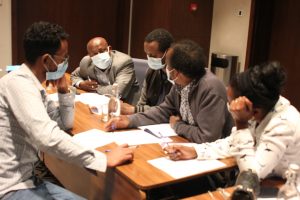Thursday, October 21, 2021- the Global Green Growth Institute (GGGI) Ethiopia Country Office convened a half-day workshop to unveil the findings of the feasibility study on Bus Rapid Transit (BRT) B2 Line project at the auditorium of Hayat Regency in Addis Ababa. A total of 15 (7M, 8F) participants including key stakeholders in the transport sector and other private enterprises attended the workshop, which was organized in collaboration with Agence Française de Développement (AFD).
The main objective of the workshop was to share the key results of the pre-feasibility study on introducing electric buses on the basic BRT service, which will be operating partly on the busway and partly in mixed traffic on ordinary roads.
The study was conducted following the Government of Ethiopia’s (GoE) bold decision to implement a BRT B2 line project to deliver a fast, comfortable, and cost-effective services at metro-level capacities in a bid to address increased congestion, greenhouse gas (GHG) emissions, incidence of road accidents, and deteriorating local air quality in the capital city of Addis Ababa. The BRT project, whose initial route will develop a 17.4km long bus lane including a 12km of dedicated corridor, has already secured €85 million sovereign concessional loan from AFD for the execution of key tasks pertaining to infrastructure, traffic management and shelters.
On behalf of the GGGI-Ethiopia Country Representative, Dr. Gemedo Dalle, Ms. Medhin Fisseha, NAP GCF Readiness Project Lead, welcomed the participants and made opening remarks highlighting the ultimate purpose and key aspects of the workshop. Ms. Medhin underlined that given sustainable and low-carbon emission transport venture has increasingly become GGGI’s strategic focus area, it has played a leading role towards adopting the e-mobility interventions and facilitating enabling environment for the implementation of the BRT Project.

Ms. Medhin further introduced major highlights of presentation which include introduction of AFD’s BRT project and plan for e-mobility, the methodology for environmental and financial impact assessment and the pre-feasibility study results. She then invited Ms. Eileen Hur, GGGI’s Associate on Policy Solutions, who joined the workshop virtually, to present key results of the pre-feasibility study on the introduction of Low-carbon Buses on BRT B2 Line in Addis Ababa, Ethiopia.
In her presentation, Ms. Eileen uncovered the far-reaching benefits of Low-Carbon Buses on BRT B2 as a viable pathway towards averting the tide of climate change induced by polluting vehicles in the city. She said initial evidence of the study have proven that the introduction of the BRT project is beneficial in terms significantly addressing environmental impacts, and thereby reducing GHG emissions on an unprecedented scale.
She also stressed that all relevant stakeholders and institutions identified to be part of the project need to clearly realize their defined roles, be capacitated, and live up to their expectations in a bid to make the much-awaited project into a tangible reality.
Ms. Eileen pointed out that the operational scenarios pertaining to the financial and economic impacts of introducing the low carbon vehicles for the suggested line in Addis Ababa will be addressed during the next study based on the 2nd operational plan.

Ms. Eileen has thus summarized and tabled for discussion the first scenario of the environmental impacts of the BRT B2 Line project
Upon completion of her presentation, Mrs. Eileen invited the participants to flag up their comments and reflections on the key findings of the Study.
Some of the major questions and concerns raised from the stakeholders included the method used for calculating the environmental benefits and costs; the strategy to be employed for charging the battery and its management of disposal and impact on the environment; the issue of electric capacity and power disruption; the weight of the electric buses and the impact they will have on the pavement; the availability of the spare parts and maintenance cost; the proactive engagement of the private sector and the financial viability of the BRT project.
Ms. Eileen Hur and Mr. Chang Sun Jang attempted to address some of the questions posed by the participants.
After the presentation and Q&A sessions, the participants grouped themselves and made discussions based on the guiding questions and reported back to the preliminary session. There was a general consensus on the need to re-consider and provide sustainable solution to the anticipated pressing challenges pertaining to the electric power distribution, recharging systems, maintenance and spare-part aspects of e-mobility buses, as well as to ensure the proactive engagement of all key stakeholders for the scrupulous implementation of the BRP project.

In closing the workshop, Ms. Medhin expressed her sincere appreciation for the valuable contribution of the workshop participants and stressed that the workshop is critically important and timely as GGGI Ethiopia is now developing its five-year Country Planning Framework. She also pointed out that the inputs gathered on the e-mobility will be incorporated in other initiatives including the NAP GCF Readiness Project.
Ms Eileen Hur on her part thanked the participants for their contribution and further noted that the result of the study will hopefully be used as a basis for further adaptation of the low carbon transportation including the electric buses in Ethiopia. She further indicated that all the discussions and inputs will be incorporated in the study document and shared with all stakeholders.